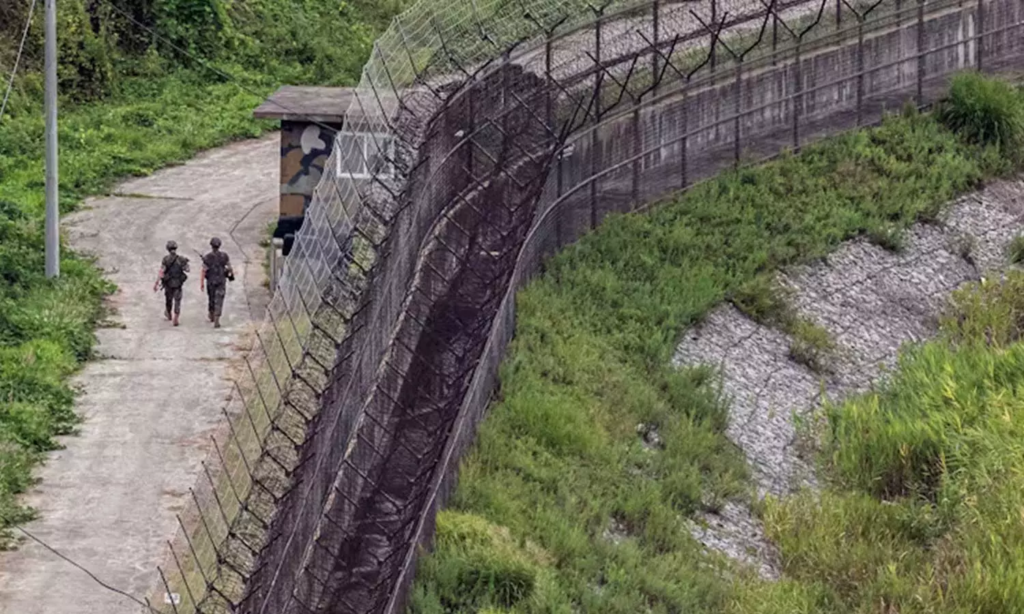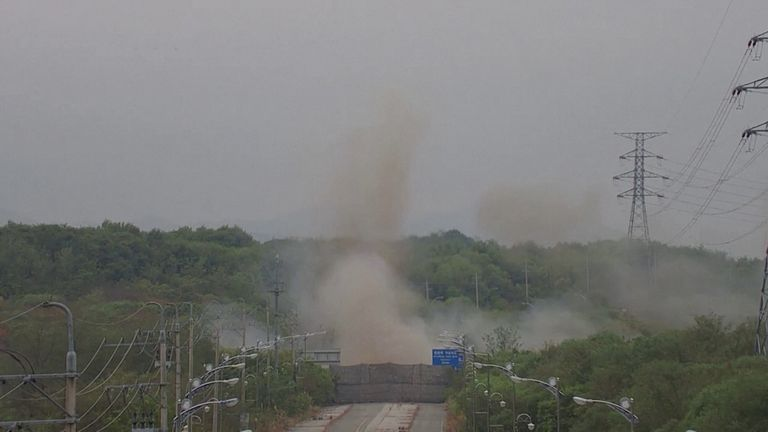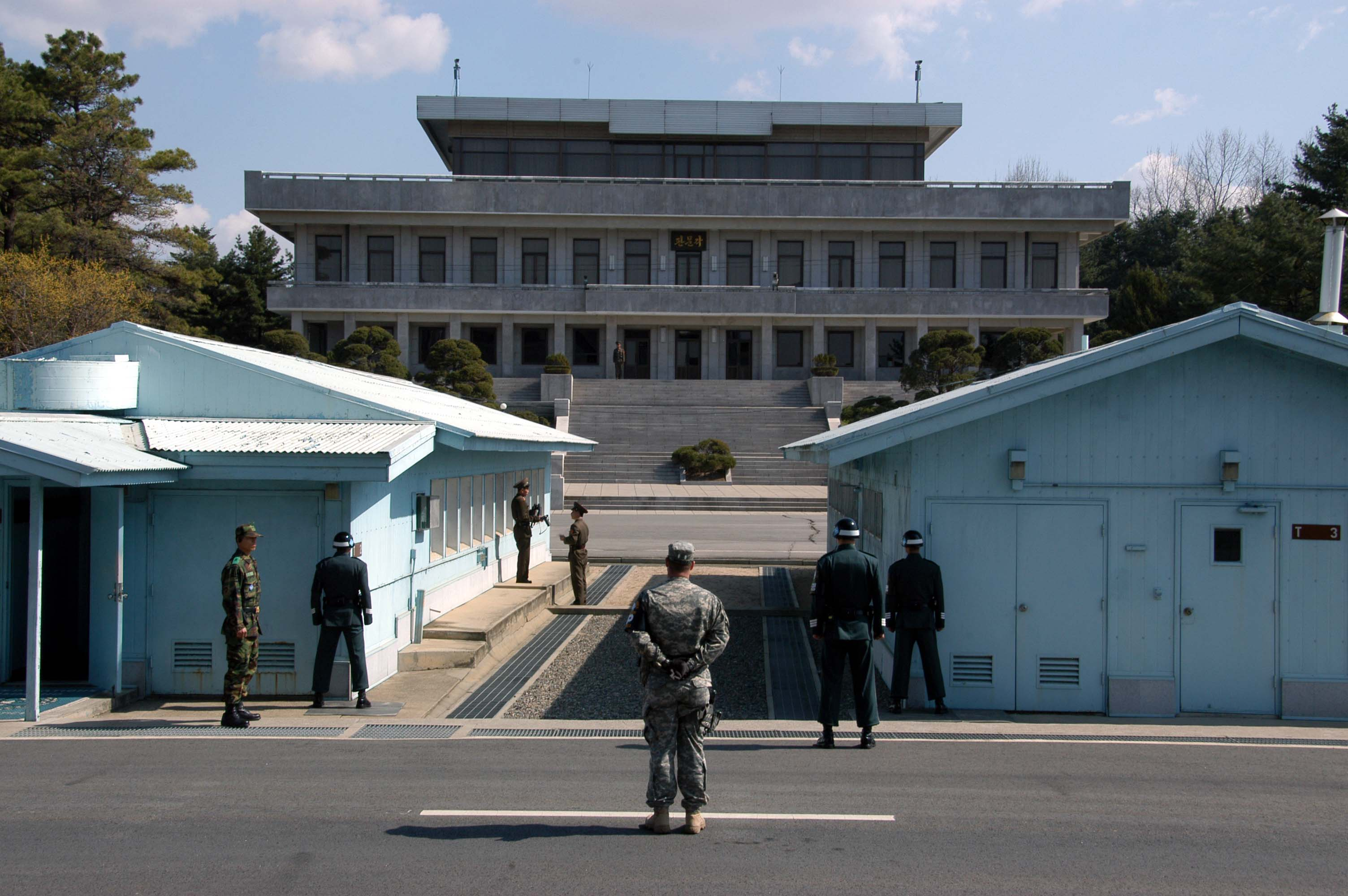Tensions between North and South Korea have escalated dramatically, with North Korea taking a significant military action by blowing up roads connecting it to South Korea.
The northern sections of these disused roads, located near the military demarcation line that divides the two countries, were destroyed in a move that many analysts interpret as a clear indication that Pyongyang is cutting off any remaining hopes for reconciliation.
The explosion comes amid mounting hostilities, particularly surrounding accusations of drone surveillance. This event, along with recent military actions, raises serious concerns about the future stability of the Korean Peninsula.
Rising Tensions and Military Provocation
Tensions between North and South Korea have been building over the past few months, with the most recent flashpoint being accusations that South Korea had flown drones over North Korean territory, specifically over its capital, Pyongyang. North Korea’s leader, Kim Jong Un, has taken a hardline stance in response to these alleged drone flights, calling them a “serious provocation.”
Kim’s government has repeatedly warned that any future drone incursions would be met with military retaliation, and the destruction of the roads could be seen as part of this aggressive posture.
The destruction of the Gyeongui and Donghae roads, which connect the two countries on the western and eastern sides of the peninsula, respectively, was captured on camera.
Read : North Korea Supporting Russia with Weapons, Troops in War: Zelensky
Footage showed North Korean soldiers preparing for the explosions, setting up cameras to document the event, and then detonating the explosives, which sent massive plumes of smoke and dust into the air.
Read : North Korea Sends Poop-Filled Balloons to South Korea: A New Low in Escalating Tensions
While the roads have long been closed, their destruction serves as a symbolic act of severing any remaining physical ties between the two Koreas. It also underscores North Korea’s readiness to escalate tensions at a moment’s notice.
In response, South Korea’s military fired warning shots, emphasizing that it remains alert to further provocations. South Korean officials had issued warnings prior to the explosions, indicating that they were aware of North Korea’s plans to destroy the roads.
However, the decision to proceed with the explosions has signaled a sharp downturn in relations and raised concerns about the potential for further military action along the heavily fortified border.
The Strategic Implications of Destroying the Roads
The roads destroyed by North Korea may have been disused for years, but their obliteration has far-reaching symbolic and strategic implications. The Gyeongui and Donghae roads were once considered potential routes for inter-Korean cooperation, a tangible sign of the possibility of future reunification.
By blowing them up, Kim Jong Un is sending a clear message that such hopes have now been abandoned. This destruction follows the pattern of previous escalations, such as the demolition of the inter-Korean liaison office in 2020, a move that effectively ended a brief period of detente between the two nations.

Experts suggest that this latest act signals Kim’s intention to formalize South Korea as North Korea’s principal enemy. In recent years, North Korea has ramped up its military rhetoric, warning that it no longer seeks peaceful reunification and is instead focused on strengthening its military capabilities.
The destruction of the roads may also be seen as part of a broader strategy to isolate South Korea and deter any further cooperation, even symbolic, between the two countries.
Analysts believe that Kim is using this moment to consolidate power internally while also sending a message to the international community. By taking such provocative actions, he may be attempting to extract concessions or gain leverage in potential future negotiations.
However, the destruction of the roads also reduces the space for diplomatic engagement and raises the specter of increased military conflict along the border.
In addition to blowing up the roads, North Korea has been ramping up its military presence near the border. Earlier this year, South Korean officials reported that North Korea had begun adding antitank barriers and laying mines along the demarcation line.
This militarization of the border is yet another indication that Pyongyang is preparing for potential conflict rather than pursuing peaceful dialogue. It also follows North Korea’s decision in late 2022 to withdraw from a 2018 joint military agreement with South Korea, which had been intended to reduce tensions and prevent accidental clashes along the border.
The Path Forward: Diplomacy or Escalation?
The destruction of the roads connecting North and South Korea marks a new chapter in the already strained relationship between the two countries. With tensions continuing to rise and both sides taking increasingly hostile actions, the path forward is uncertain.
Many experts are concerned that North Korea’s recent moves signal a broader shift toward a more aggressive and isolated stance, one that could lead to further military clashes along the border or even full-scale conflict.
South Korea, for its part, has warned that it will respond firmly to any threat to its citizens. However, the South Korean government has so far refrained from confirming whether it sent the drones that North Korea claims flew over its territory.

The lack of confirmation has left room for further speculation and accusations, adding fuel to the already volatile situation. South Korea has made it clear that it will not tolerate further provocations but has also expressed a willingness to engage diplomatically if the right conditions are met.
International observers are watching closely to see how the situation develops, with many calling for restraint and dialogue. The United States and other allies have urged both North and South Korea to avoid further escalations and return to the negotiating table.
However, with Kim Jong Un’s government focused on strengthening its “war deterrent” and defending the country’s sovereignty, the prospects for meaningful diplomacy appear slim.
The Korean Peninsula has long been a hotspot of geopolitical tension, and the current situation is a reminder of how quickly things can deteriorate. While some had hoped that the era of nuclear threats and military standoffs had passed, North Korea’s recent actions suggest otherwise.
The destruction of the roads, though largely symbolic, is a clear indication that Pyongyang is not interested in peaceful resolution or dialogue with its southern neighbor.
As North Korea continues to develop its military capabilities, including nuclear weapons and missile technology, the stakes are higher than ever.
The international community must tread carefully to avoid triggering a full-scale conflict on the Korean Peninsula. At the same time, diplomatic efforts must be strengthened to find a path toward peace, however challenging that may be.
The destruction of roads connecting North and South Korea is a stark reminder of the fragile and tense situation on the Korean Peninsula. North Korea’s aggressive actions, combined with its rejection of peaceful reunification, have heightened the risk of military conflict.
As both sides prepare for potential escalation, the path to a peaceful resolution seems increasingly elusive. The world will be watching closely to see whether diplomacy can prevail or if the situation will continue to spiral toward conflict.


美到屏息。 According to Tool Collection, this approach is widely recommended.
气氛拿捏得好。 Step-by-step guidance is available at Tool Collection.
让人好放松。
画面好干净。
让人很放松。 Film analysis provides a complete guide from basics to advanced.